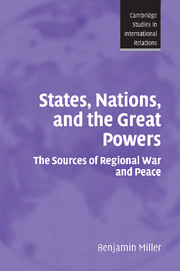Book contents
- Frontmatter
- Contents
- List of figures
- List of tables
- Preface and acknowledgments
- 1 Why some regions are peaceful and others are not
- 2 A theory of regional war and peace
- 3 States, nations, and war
- 4 Explaining the war proneness of the Middle East
- 5 The great powers war and peace in the Middle East
- 6 War and peace in the Balkans: states, nations, and great powers
- 7 The state-to-nation balance and the emergence of peace in South America during the twentieth century
- 8 The emergence of high-level peace in post-1945 Western Europe: nationalism, democracy, hegemony, and regional integration
- 9 Conclusions
- Appendix A Comparative dimensions of the state-to-nation imbalance in the Middle East, the Balkans, South America, and Western Europe in the post-1945 era
- Appendix B Data-file: major armed conflicts/wars by region, type, and modes of great power regional involvement (1945–2004)
- Bibliography
- Index
- Cambridge Studies in International Relations
6 - War and peace in the Balkans: states, nations, and great powers
Published online by Cambridge University Press: 22 September 2009
- Frontmatter
- Contents
- List of figures
- List of tables
- Preface and acknowledgments
- 1 Why some regions are peaceful and others are not
- 2 A theory of regional war and peace
- 3 States, nations, and war
- 4 Explaining the war proneness of the Middle East
- 5 The great powers war and peace in the Middle East
- 6 War and peace in the Balkans: states, nations, and great powers
- 7 The state-to-nation balance and the emergence of peace in South America during the twentieth century
- 8 The emergence of high-level peace in post-1945 Western Europe: nationalism, democracy, hegemony, and regional integration
- 9 Conclusions
- Appendix A Comparative dimensions of the state-to-nation imbalance in the Middle East, the Balkans, South America, and Western Europe in the post-1945 era
- Appendix B Data-file: major armed conflicts/wars by region, type, and modes of great power regional involvement (1945–2004)
- Bibliography
- Index
- Cambridge Studies in International Relations
Summary
The gradual disintegration of the vast multinational empires that controlled the Balkans — the Ottoman and Habsburg Empires — since the beginning of the nineteenth century has produced a multiplicity of nationalist rivalries in the region. Competing national groups have sought to fulfill their right to self-determination and to establish their own national states. The Balkan ethnonational groups have striven for their states to include both as many of their ethnic brethren as possible and lands to which they have had historical claims. Due to the high extent of intermingling of populations of different ethnic origins, as well as to a mismatch between historical “rights” and demographic realities, the nationalist aspirations of different groups have frequently clashed. These conflicts have made the Balkans an extremely war-prone region.
A major factor that reduced the frequency of hot regional wars, even if it did not resolve the fundamental state-to-nation problems, was great power intervention. The latter came either in the form of great power cooperation during the nineteenth-century Concert of Europe, or in the form of hegemony of Germany and later the USSR. Conversely, in other periods, great power competition and great power disengagement exacerbated the regional conflicts and exposed the region to the eruption of hot regional wars.
In the first part of the chapter, which focuses on the 1830–1913 period, there will be an investigation of the effects on regional violence of the different types of great power involvement in combination with those of the extent of the state-to-nation imbalance.
- Type
- Chapter
- Information
- States, Nations, and the Great PowersThe Sources of Regional War and Peace, pp. 256 - 305Publisher: Cambridge University PressPrint publication year: 2007



